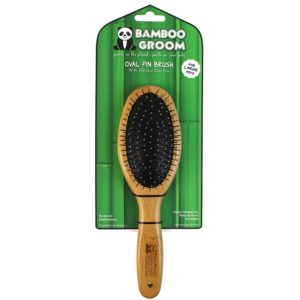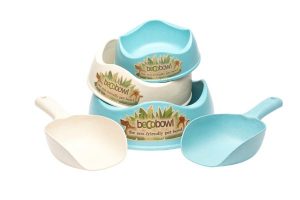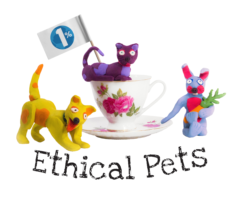According to science, not all bamboo products are more sustainable than their non-bamboo alternatives. Shipping bamboo products over from China has a big environmental impact so the products need to be eco enough to mitigate that. Here’s some science and some bamboo pet products to consider!
Joost Sayin

Sustainability Scientist Dr Joost Vogtländer concluded [1] that bamboo is most eco-friendly when used as an alternative to FSC certified hardwood. For example in flooring and furniture where strength, durability and attractiveness are important.
Theoretically, it’s better to use European Oak or Walnut as they don’t need to be shipped by boat. I thought about this some more and concluded that the yields of bamboo are so much higher than these European hardwoods that bamboo will probably be much easier to source and cheaper!
For anything where European softwoods (like pine) are an option however, bamboo is much less eco-friendly.
Next learn how this science applies to our bamboo pet products.
Bamboo Groom
 So, for our first sustainable bamboo pet product: Bamboo Groom! We stock a range of pet brushes and combs from Bamboo Groom. This is an eco-friendly alternative to plastic brushes. Bamboo Groom chose to use bamboo because it’s so tough and durable: these brushes should last a really long time.
So, for our first sustainable bamboo pet product: Bamboo Groom! We stock a range of pet brushes and combs from Bamboo Groom. This is an eco-friendly alternative to plastic brushes. Bamboo Groom chose to use bamboo because it’s so tough and durable: these brushes should last a really long time.
Additionally, the bamboo handle and the natural oil used to polish it are biodegradable. This means you can dispose of the brush by burying it in the garden (after removing the bristles). The metal bristles can be put into the recycling bin as they are made from stainless steel.
Good things about Bamboo
- It grows quickly, some species can grow 91 cm (36 in) in 24 hours
- It grows in tricky places that you couldn’t grow other crops/trees in
- When you harvest it the roots are unaffected and so it will grow more shoots to be harvested again
- The value of the finished product is kept and circulated locally because processing and manufacture is done where the raw materials are grown.
- It’s a very strong material, tougher than most wood
Made in China? Good!
“Made in China” has a bit of a bad reputation, right? Plastic knickknacks made by badly treated people. Stuff shipped for thousands of miles and as a consequence there are no manufacturing jobs in the UK. Right?
However, there is another side to this story! It goes like this. In the west we have a habit of buying raw materials such as tea, cocoa and wood from other, often poorer counties. We pay low prices to the people who grow and harvest the raw materials. We then transform the materials into the finished form closer to home. This adds monetary value to the product in a way that means people who grew the raw materials won’t see any benefit either through jobs or money circulating in their economy etc.
But Bamboo is different. Unusually, the countries that grow bamboo do nearly all processing and manufacture. This is mostly because bamboo is really inefficient (expensive) to ship in it’s raw form – it’s hollow and tubular after all!
Consequently, Skilled jobs in bamboo processing and manufacturing are located in China where the bamboo is grown. We think this is a good thing, as long as the people who work in the factories are treated well.
BecoBowls
 Now, onto our second sustainable bamboo pet product: BecoBowls!
Now, onto our second sustainable bamboo pet product: BecoBowls!
When a bamboo stem is harvested plybamboo boards (like plywood) are made from the thicker bottom part. Things like chopsticks are made from the The thinner top parts.
When chopsticks are made, there is some waste material left over because they are narrower at the end. That’s the stuff BecoBowls are made from!
BecoBowls are a good example of an ethically made Bamboo product from China. Beco own their own factory and so have a long term relationship with, and responsibility for, their employees.
The benefit of having a bamboo BecoBowl is that, in life it’s dishwasher proof and super tough. But once it’s old and manky you can smash it and bury the pieces in the garden. Then they will biodegrade. It’s a highly sustainable alternative to plastic that doesn’t take land away from food production, as it’s using up-cycled waste material.
References
[1] The sustainability of bamboo products for local and Western European applications. LCAs and land-use in the Journal of Cleaner Production by Joost Vogtländer, Pablo van der Lugt, Han Brezet
